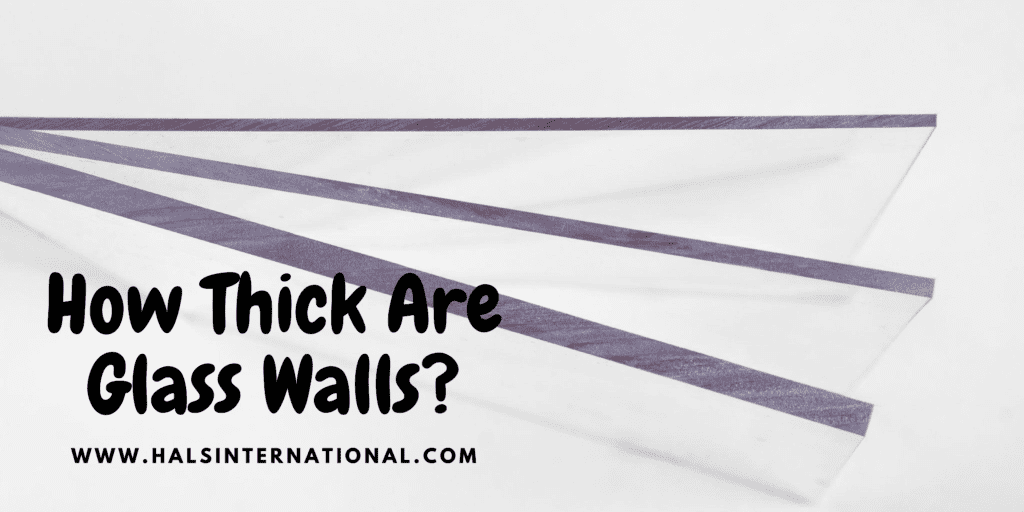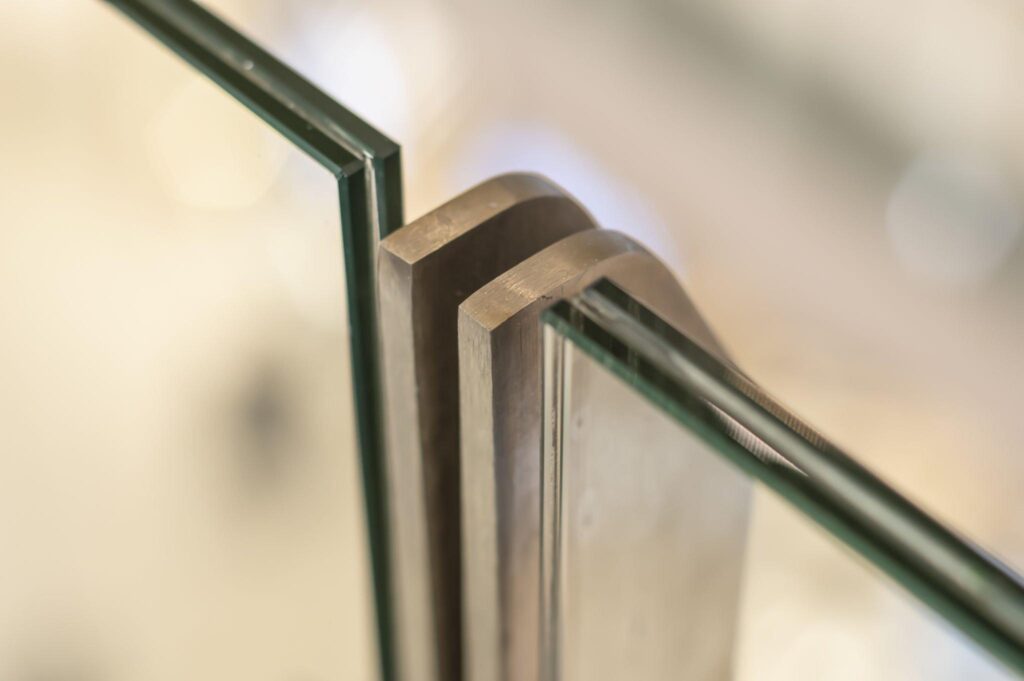
Table of Contents
There has been an explosion in the popularity of glass walls in modern architecture and interior design. The windows bring in natural light, offer breathtaking views, and provide a sense of openness and transparency. You might wonder how thick your Thick Glass Walls must be to ensure safety and functionality if you consider incorporating them into your space. We considerations that architects and designers consider when specifying the consistency of these structures. In this article, we’ll delve into the world of glass walls and explore the services offered by HalsInternational, a renowned glass manufacturer specializing in glass wall fittings.
Appeal Of Glass Walls
Glass walls have gained popularity in modern architecture due to their ability to create a sense of openness and transparency. They offer unobstructed views, flood interior spaces with natural light, and provide a seamless transition between indoor and outdoor areas. Glass walls can be found in various settings, including residential homes, offices, retail spaces, and hotels. To ensure their structural integrity and safety, the thickness of the glass used in these walls plays a crucial role.
Check out our glass products here:
Importance of Glass Wall Thickness
Glass walls are designed to withstand various forces, including wind loads, thermal stress, and impact resistance. Glass walls are not merely aesthetic additions to a space; they also serve structural and safety purposes. It is essential for the strength and durability of your walls that the thickness of the glass used is sufficient. Let’s break down the importance of glass wall thickness:
Safety
Thicker glass offers better resistance to breakage and shattering, ensuring the safety of occupants in case of accidents or extreme conditions.
Insulation
Glass thickness affects thermal insulation. Thicker glass provides better insulation, helping to maintain a comfortable indoor temperature and reducing energy costs.
Soundproofing
Glass thickness influences sound transmission. Thicker glass can significantly reduce noise from the outside, creating a quieter and more peaceful indoor environment.
The Role Of Glass Thickness
The thickness of glass walls primarily depends on the height and size of the glass panels, environmental factors, design intent, and safety regulations. Thicker glass panels can provide increased strength and stability, making them suitable for taller and larger installations.
Types Of Glass Used In Glass Walls
Several types of glass can be used in glass walls, including tempered glass, laminated glass, and insulated glass units (IGUs). Tempered glass is treated with heat to increase its strength, making it more resistant to impacts and thermal stress. Laminated glass consists of two or more layers of glass bonded together with an interlayer, providing enhanced safety and security. IGUs incorporate multiple glass panes separated by a sealed airspace, improving insulation and soundproofing.
Impact Resistance And Safety Considerations
Glass walls must meet specific safety standards to ensure the protection of occupants. Impact resistance is an essential consideration, especially in areas prone to severe weather conditions or potential human impact. Thicker glass can enhance impact resistance and minimize the risk of breakage.
Contact Us For Unique Products And Services
Factors Influencing Glass Wall Thickness
Several factors influence the determination of glass wall thickness. Architects and designers carefully consider these factors to achieve a balance between aesthetics, functionality, and structural integrity.
Height And Size Of Glass Panels
The height and size of the glass panels are crucial factors in determining their thickness. Taller and larger panels require thicker glass to withstand the increased wind loads and structural stresses they may experience.
Environmental Factors
Environmental factors such as wind speed, temperature variations, and seismic activity play a significant role in glass wall design. Areas with high wind speeds or frequent seismic activity may require thicker glass to ensure structural stability and prevent damage.
Design Intent And Aesthetic Considerations
Architects often have specific design intents and aesthetic goals when incorporating glass walls into a building. The desired visual effect, transparency level, and overall architectural style influence the selection of glass thickness. Thinner glass may be preferred for a sleek and minimalist look, while thicker glass can create a more substantial and robust appearance.

Building Codes And Safety Regulations
Building codes and safety regulations set standards for glass wall construction to ensure the safety of occupants. These codes provide guidelines on minimum glass thickness, safety glazing requirements, and load-bearing capacities. Compliance with local building codes is essential to obtain necessary permits and approvals for glass wall installations.
Local Building Codes
Each jurisdiction may have specific building codes that outline the requirements for glass wall thickness and safety features. Architects and builders must consult these codes to ensure compliance with local regulations.
Safety Standards And Testing
Various safety standards and testing procedures govern the manufacturing and installation of glass walls. These standards assess factors such as impact resistance, load-bearing capacity, and breakage patterns. Testing ensures that glass walls meet the necessary safety requirements and can withstand anticipated loads and stresses.
Choosing Right Thickness For Glass Walls
Selecting the appropriate thickness for glass walls involves a comprehensive analysis of various factors. Architects, structural engineers, and glass manufacturers collaborate to determine the optimal thickness based on the specific project requirements.
Consulting With Structural Engineers
Structural engineers play a crucial role in assessing the structural integrity of glass walls. They consider factors like wind loads, safety regulations, and environmental conditions to recommend the appropriate glass thickness that ensures the long-term durability and safety of the installation.
Balancing Aesthetics And Functionality
Achieving a balance between aesthetics and functionality is essential in glass wall design. Architects work closely with clients to understand their preferences and design goals while considering the structural requirements. The selected glass thickness should fulfill both aesthetic aspirations and safety standards.
Considering Energy Efficiency
Glass walls can impact a building’s energy efficiency by affecting heat transfer. Thicker glass panels with better insulating properties can contribute to improved energy efficiency by reducing heat loss or gain. Factors like the building’s location, climate, and sustainability goals influence the choice of glass thickness.
Conclusion
To create an open and visually appealing space, glass walls are an elegant and modern solution. This wall’s structural integrity, safety, and performance are highly dependent on the glass thickness. Various factors, including size, environment, design intent, and safety regulations determine the thickness of glass panels. In addition to enhancing architectural design, glass walls can provide a seamless connection between indoors and outdoors while balancing aesthetics, functionality, and structural requirements.
When considering glass wall fittings, trust the experts at HalsInternational to provide you with the finest solutions according to your project’s requirements. Contact Us Now.
Frequently Asked Questions
Glass walls can be safe when designed and installed according to appropriate safety standards and building codes. The use of impact-resistant glass and compliance with safety regulations enhances the safety of glass wall installations.
While glass walls are not inherently soundproof, certain types of glass, such as laminated glass or insulated glass units, can significantly reduce noise transmission and improve sound insulation.
The energy efficiency of glass walls depends on factors such as glass thickness, coatings, and insulation properties. Thicker glass with better insulating properties can contribute to improved energy efficiency by reducing heat transfer.
Regular cleaning with appropriate glass cleaners and soft materials is essential to maintain the appearance of glass walls. It is advisable to follow the manufacturer’s recommendations for maintenance and avoid using abrasive materials that may scratch the glass surface.
Yes, glass walls offer a high level of customization. They can be tailored to meet specific design requirements, including size, shape, transparency level, and even incorporating decorative elements or patterns.
Safety glass is highly recommended for glass walls, especially in high-traffic areas or spaces where safety is a concern. HalsInternational can advise you on the best safety glass options for your project.
